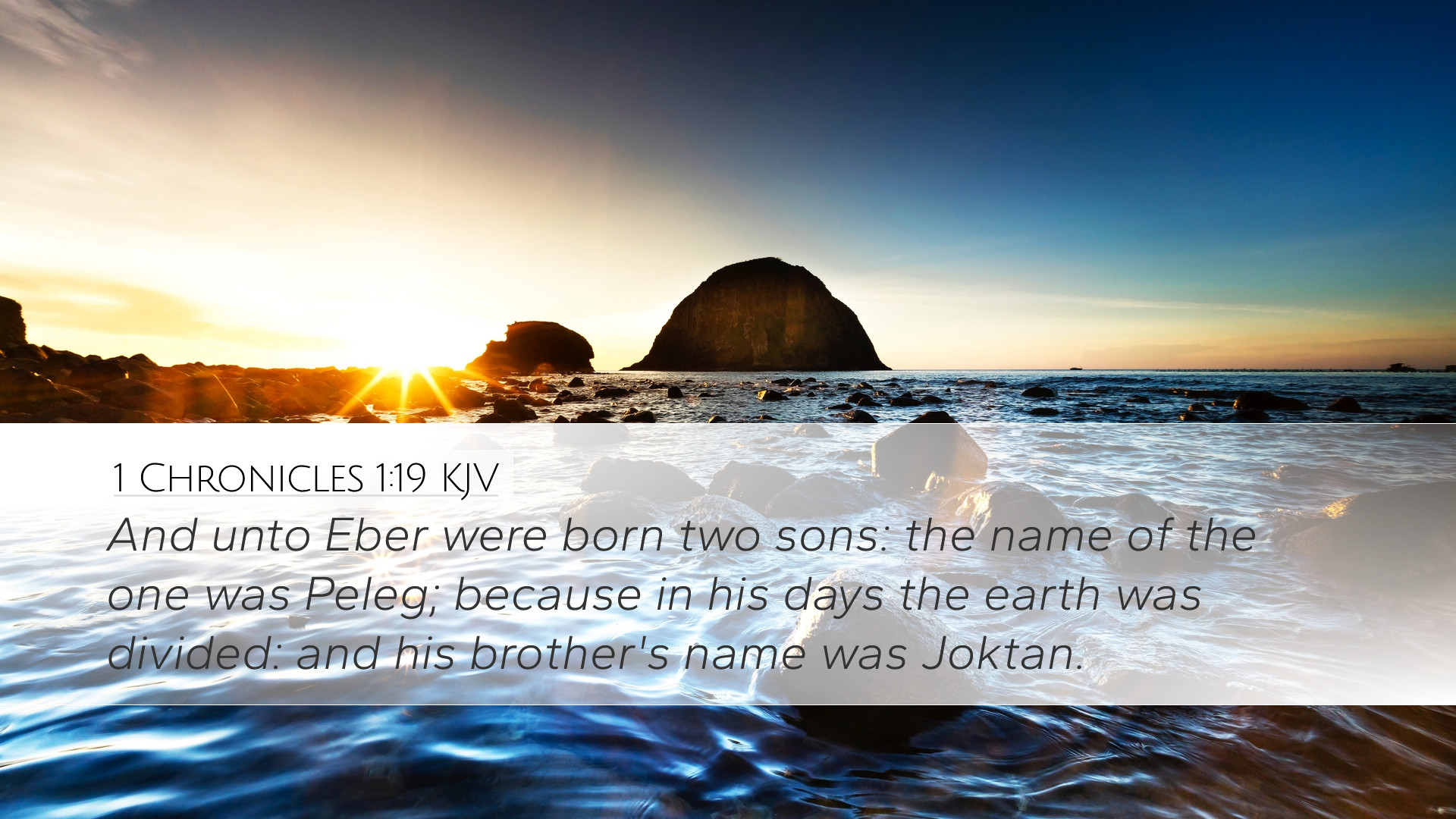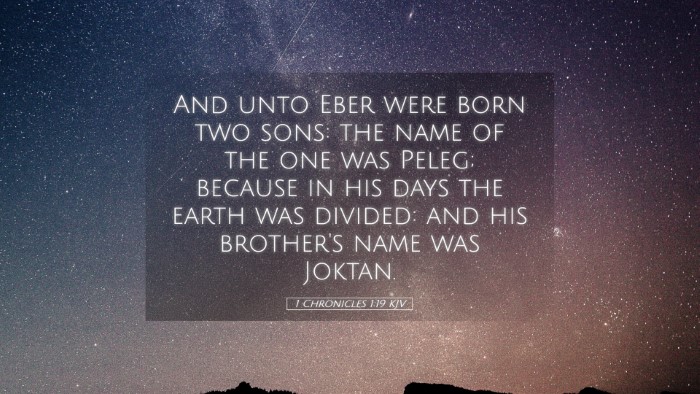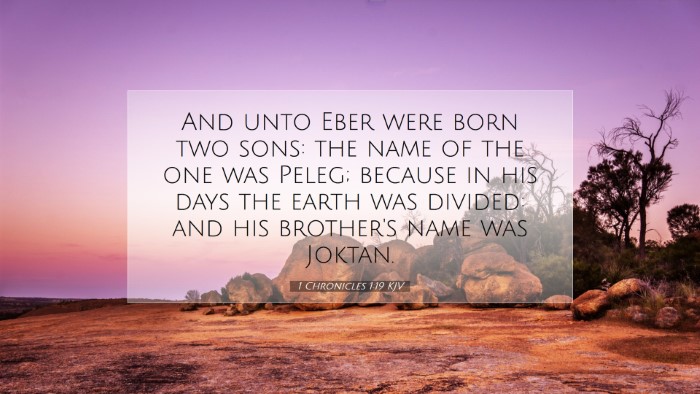Commentary on 1 Chronicles 1:19
Verse: 1 Chronicles 1:19 - "And unto Eber were born two sons: the name of one was Peleg; for in his days was the earth divided; and his brother's name was Joktan."
Overview
1 Chronicles 1:19 gives insight into the genealogical lineage of the Israelites, specifically noting the descendants of Eber, a prominent figure in the biblical narrative. The mention of Peleg and Joktan introduces significant historical and theological themes, including the division of the earth and the resulting dispersion of nations. This commentary synthesizes insights from various public domain commentaries, which emphasize the genealogical importance and the implications of division mentioned in the text.
Genealogical Significance
Matthew Henry highlights the genealogical aspect of this verse, noting that Eber is a critical progenitor in the lineage leading to Abram (Abraham). He points out that the genealogies serve to establish the fulfillment of God's promises to the patriarchs. The mention of Peleg signifies a particular moment in biblical history that holds deeper significance.
The Name Peleg
Both Albert Barnes and Adam Clarke address the meaning behind the name Peleg, which is derived from the Hebrew root meaning "to divide." Barnes notes that the name signifies a pivotal moment during which the earth was divided, which could imply either a geographical division or the scattering of peoples. This notion of division is essential in understanding the post-flood world, where humanity, once united, began to spread out.
The Context of Division
Henry elaborates that the "division of the earth" can be interpreted in two ways: the geographical division of land masses or the division of peoples into nations. On the other hand, Clarke points to the association with the Tower of Babel (Genesis 11), when God confounded human language and led to the dispersion of nations. This context illustrates that the descendants of Peleg played a major role in the narrative of humanity’s development post-Babel.
The Role of Joktan
The text also mentions Joktan, Peleg’s brother, which serves to establish a contrast with Peleg. Henry explains that Joktan's descendants were involved in the Arabian tribes, highlighting the diverse nations that emerged from Eber’s lineage. This division between Peleg and Joktan symbolizes the branching out of human cultures and histories following the events triggered by divine intervention.
Joktan’s Descendants
Commentators like Barnes suggest that the descendants of Joktan represent the various nations that inhabited the southern regions, particularly the Arabian Peninsula. Understanding Joktan's lineage is crucial for biblical historians as it traces the Arab tribes that play significant roles in later Scripture. Clarke points out that the lists of Joktan's descendants, found in later biblical texts, serve to establish connections to historical peoples and events in ancient history.
Theological Implications
This verse is replete with theological implications regarding God's sovereignty over nations. The division mentioned serves to emphasize God's control over human history, where He directs the growth and spread of humanity according to His divine plan. Both Hengstenberg and Barnes note that the division also allows for the development of distinct cultures, each with its own contributions to the overarching narrative of humanity’s relationship with God.
Unity and Diversity
The theme of unity and diversity also arises from this passage. Initially, all of humanity was united, but through divine action, God introduced diversity among nations. Henry suggests that this diversity is intentional, allowing for a multitude of peoples to glorify God in various ways. Each nation has its unique expressions of faith, culture, and worship that contribute to the global tapestry of worship due to God.
Contemporary Relevance
For modern readers, particularly pastors, students, and scholars, the insights from 1 Chronicles 1:19 speak to the ongoing exploration of identity, culture, and God's plan. The division between peoples prompts contemporary discussions about unity in diversity within the church. How can the modern-day church reflect the unity that exists despite cultural differences, as illustrated by the descendants of Eber, Peleg, and Joktan?
The Call to Unity in Diversity
In light of this commentary, it is evident that the church is called to embrace its multicultural nature while remaining unified in Christ. The diverse backgrounds can enrich worship and deepen understanding of God's revelation across different cultures. The historical divisions should remind believers to celebrate diversity as part of God's creation rather than as divisive factors.
Conclusion
In conclusion, 1 Chronicles 1:19 offers a wealth of insight into God's providential orchestration of history through genealogies. Commentators Matthew Henry, Albert Barnes, and Adam Clarke provide a foundation for understanding the genealogical and theological significance of this passage. As readers meditate on these verses, they are encouraged to appreciate the richness of God's plan for humanity and the importance of recognizing both unity and diversity in the current age, reflecting on the legacy of faith established through Eber, Peleg, and Joktan.


